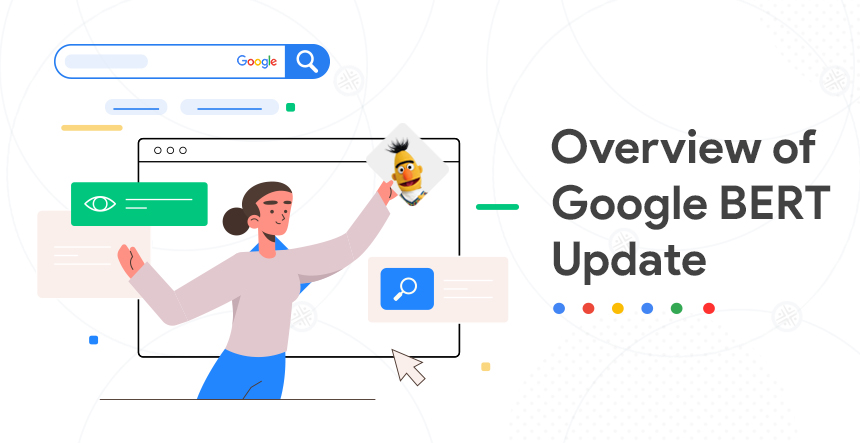




Google BERT stands for Bidirectional Encoder Representations from Transformers. These words may seem confusing to someone without any coding knowledge. In simpler terms, Google BERT is one type of AI that allows Google to correctly understand the relationship between different elements of a language when searching for something. With this latest update, Google can now generate more accurate results for complex or long-tail search terms. With the latest adjustment to its algorithm, Google now takes into account the meaning or position of the prepositions whenever generating results based upon search queries.
Google ‘BERT’ Algorithm was introduced on October 25, 2019, and was advertised as the biggest advance in Google’s search algorithms in the last five years. Google announced that BERT will affect 10% of the overall queries and this is true for the searches being performed in all languages. BERT is believed to be one of the biggest leaps ahead in the history of search and this latest update is going to have a significant impact on Featured Snippets or Search Snippets.
The BERT model has been designed to processes words about other words in a sentence. (The older algorithm processed words one-by-one in order). This latest change focuses on the context and intent of the search query and delivers more accurate results.
It is important to understand that BERT focuses on understanding the search queries instead of focusing on the content. It is equally important to know that Google BERT does not intend to penalize the websites similar to previous updates, such as Penguin and Panda.
In a nutshell, Google’s algorithm looks closely at the order of words in a query to understand the intent of a particular search.
For example, in yesteryears, the ‘stop words’ that included prepositional words, such as ‘to’ and ‘from’ were considered to be unimportant. However, it changes with the introduction of BERT. This search algorithm is supposed to look closely at the meaning and location of all prepositional words (where prepositions appear in a search query) to get the correct meaning of a sentence. The following example may help you understand how the introduction of BERT improves the outcome of any search query.
For example, you may write in the search bar – “Brazil traveler to the USA needs a visa”. In this scenario, the previous algorithms would have produced information for USA citizens traveling to Brazil, as it would not consider the preposition.
With the latest algorithm (BERT), Google tries to understand the meaning of the sentence after evaluating the position of each word along with this proposition. Therefore, Google can understand that the searcher is looking for information regarding the visa requirements for individuals travelling to the USA from the UK.
This example clearly shows how BERT has revolutionized the process of producing results based upon a search query.
According to Google, BERT is going to affect 1 in 10 search-queries around the world and for all languages. It may seem like a significant impact as it is going to affect 10% of all searches. However, it is important to understand that BERT comes into play for long-tail keywords instead of ‘head’ keywords. Hence, the effect of this latest update in the algorithm may be felt on two types of search-queries –
The websites containing the long-form contents, such as tutorials, guides or ‘how-to’ articles, are going to benefit from the introduction of Google BERT, as it is going to impact the ‘complex search’ queries and is supposed to make the comprehensive content more discoverable.
People usually perform three different types of queries when searching for something –
The following examples may clarify the difference between the three types of queries.
For example, someone may want to lose weight. However, he/she does not know to lose weight and writes “how to lose weight” during the search query. This type of query is known as the ‘Informational ‘query.
With this type of query, a searcher may find the names of different types of diets and he/she may search for one type of diet from the list of suggested diets, such as South Beach Diet. This type of query is known as ‘Navigational’ search query.
After finding out an exact solution, a searcher may search for a cookbook of or for recipes of South Beach diet. This type of query is known as ‘Transactional’ search query.
Google’s BERT is likely to impact the keywords used during Informational search queries instead of other queries. According to Danny Sullivan from Google, the SEO experts need not change their technique for Search Engine Optimization (SEO). Google’s algorithm has always focused on the quality of any type of content instead of the number of words even when ranking the websites with long-form content. This ranking technique is going to remain unchanged despite the introduction of BERT. This algorithm is also going to reward the natural contents and the SEO experts need to focus on creating content that is unique, informative, useful and compelling to the readers, viewers, and listeners.
It is important to remember that keyword density is not essential for the optimization of a website on Google. With the introduction of BERT, Google is focusing on understanding the context of any content. Hence, keyword density is going to be even less important in the future and the quality of any content is going to be a decisive factor during search engine optimization.
It is equally essential to create content that gives data or answers on particular subjects to rank higher than the competitors for ‘Informational’ keywords. Therefore, it is essential to focus on delivering better experience whenever creating any type of content (videos, images, texts or audio).
The introduction of Google BERT algorithm shows how machine learning is changing the nature of organic search. These days, most people use Internet-enabled mobile phones to search for something and the number of individuals requiring the assistance of virtual assistants has also increased over the past few years. Hence, it has become important for Google to understand the context of conversational search queries and BERT can help with this task. With the introduction of this algorithm, Google has increased its focus on NLP (Natural Language Processing).
Subscribe to our newsletter and learn about the latest digital trends.